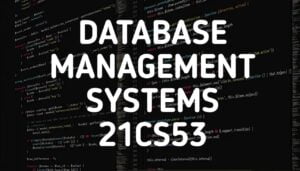
21CS53 Database Management Systems
Module 1`
Introduction to Databases: Introduction, Characteristics of database approach, Advantages of using the DBMS approach, History of database applications.
Overview of Database Languages and Architectures: Data Models, Schemas, and Instances. Three schema
architecture and data independence, database languages, and interfaces, The Database System environment.
Conceptual Data Modelling using Entities and Relationships: Entity types, Entity sets, attributes, roles, and structural constraints, Weak entity types, ER diagrams, Examples
Module 2
Relational Model: Relational Model Concepts, Relational Model Constraints and relational database schemas, Update operations, transactions, and dealing with constraint violations.
Relational Algebra: Unary and Binary relational operations, additional relational operations (aggregate, grouping, etc.) Examples of Queries in relational algebra.
Mapping Conceptual Design into a Logical Design: Relational Database Design using ER-to-Relational mapping.
Module 3
SQL: SQL data definition and data types, specifying constraints in SQL, retrieval queries in SQL, INSERT, DELETE, and UPDATE statements in SQL, Additional features of SQL.
Advances Queries: More complex SQL retrieval queries, Specifying constraints as assertions and action triggers, Views in SQL, Schema change statements in SQL.
Database
Application Development: Accessing databases from applications, An introduction to JDBC, JDBC classes and interfaces, SQLJ, Stored procedures, Case study: The internet Bookshop.
Module 4
Normalization: Database Design Theory – Introduction to Normalization using Functional and Multivalued Dependencies: Informal design guidelines for relation schema, Functional Dependencies, Normal Forms based on Primary Keys, Second and Third Normal Forms, Boyce-Codd Normal Form, Multivalued Dependency and Fourth Normal Form, Join Dependencies and Fifth Normal Form. Examples on normal forms.
Normalization Algorithms: Inference Rules, Equivalence, and Minimal Cover, Properties of Relational Decompositions, Algorithms for Relational Database Schema Design, Nulls, Dangling tuples, and alternate Relational Designs, Further discussion of Multivalued dependencies and 4NF, Other dependencies and
Normal Forms
Module 5
Transaction Processing: Introduction to Transaction Processing, Transaction and System concepts, Desirable properties of Transactions, Characterizing schedules based on recoverability, Characterizing schedules based on Serializability, Transaction support in SQL.
Concurrency Control in Databases: Two-phase locking techniques for Concurrency control, Concurrency control based on Timestamp ordering, Multiversion Concurrency control techniques, Validation Concurrency control techniques, Granularity of Data items and Multiple Granularity Locking
Aw, this was a very good post. Finding the time and actual effort to create a very good article… but what can I say… I put things off a whole lot and don’t manage to get anything done.
It’s difficult to find well-informed people on this subject, but you seem like you know what you’re talking about! Thanks
Everyone loves it when folks get together and share ideas. Great blog, stick with it.
After looking into a few of the articles on your blog, I truly appreciate your technique of blogging. I book marked it to my bookmark site list and will be checking back in the near future. Please check out my website too and tell me your opinion.
I like this blog very much, Its a rattling nice place to read and receive info.!
hey there and thank you for your information – I have definitely picked up anything new from right here.
I did however expertise a few technical issues using this website, as
I experienced to reload the web site lots of times previous to
I could get it to load properly. I had been wondering if your web
host is OK? Not that I’m complaining, but slow loading instances times will often affect your
placement in google and could damage your high-quality
score if ads and marketing with Adwords. Well I am
adding this RSS to my email and can look out for a lot more of your respective
exciting content. Ensure that you update this again soon..
Najlepsze escape roomy